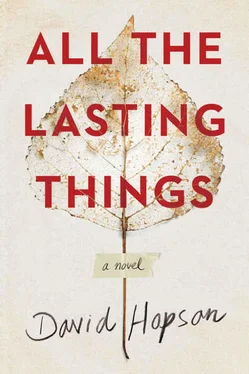“Mom?”
Someone, Evelyn thought by her daughter’s tone, is dead. “What’s the matter?”
“Calm, Mom, calm down. I haven’t said anything yet.” Claudia spoke in an unusually soft, coaxing voice that was anything but calming.
“What’s the matter? Where are you?”
“I’m at the hospital.”
“The hospital? Are you okay?”
“I’m fine.”
“Is Oliver?”
“It’s Benji.”
Evelyn dropped the paintbrush, its moist tip kissing the top of her slippered foot.
“He’s okay. They’re pretty sure he’s going to be okay.”
“Claudia, tell me right now.”
“I can’t tell you if you don’t calm down. And I can’t stay on the phone long.”
Cast helplessly into silence, Evelyn bit into her bottom lip and listened.
“There was an accident. Or. They won’t say it was an accident. But there was a fall.”
“Benji? Benji fell? Where are you? I’m coming.”
“Mom, no. No. Not until we know what’s happening. You’re better off there, with Daddy.”
“Sandra can stay with your father.”
“There’s nothing for you to do. There’s nothing for me to do. I’m sitting here. The doctors are still with him.”
“But what happened ?” Evelyn pressed Claudia on the how, the why, the where, and Claudia, never dropping her mask of calm, answered with maddening composure. “Saratoga!” Evelyn cried. “What is he doing in Saratoga?”
“A play.”
“He never told me he was doing a play! As if I wouldn’t have gone to—”
“Well, now’s not the time to get upset about that.” Evelyn hushed, chastened. “Mom? Are you there?”
“What do you mean they won’t say it’s an accident?” Evelyn heard Claudia take a breath, a deep, shuddering breath, as if she were going underwater for a long time.
“They think he may have jumped.”
Evelyn put a hand to her heart. “Who thinks that?”
“I’m telling you what they told me.”
“Who is they?”
“The people who found him. The police. Everybody.” The tremor in Claudia’s voice, comforting.
“Why would they say that? He wouldn’t do that. He would never do that.”
More silence.
“I talked to him last week,” Evelyn insisted.
“So did I.”
“Why would they say he jumped?”
“I know as much as you do, Mom.”
Evelyn shook her head vigorously, as if she could loosen the idea of her son choosing to plummet to his death and send it flying out of her head. “Your brother’s not unstable.” Then, tuned to the possibility of some waspish response, “Not unstable like that .”
“There is precedence,” Claudia said softly.
The word precedence irked Evelyn, as if they were arraigning Benji in a court of law. “What? The pills? I wish you wouldn’t bring that up. It was twenty-five years ago. And he did that for attention. He barely took enough to put himself to sleep.”
“I don’t want to believe it either, but who’s to say he’s not looking for attention now. We’re talking about Benji.”
“That’s how you talk about your brother? At a time like—?” Evelyn’s voice crumbled under the weight of the sentence. She put her hand against the wall, as if she, too, might fall, and cried.
“I don’t know what to think. But the more I think about it — I wouldn’t exactly say Benji is happy.”
Happy? Evelyn thought. Who is?
“Mom,” Claudia began, but confusion and sadness and a sickening tide of outrage had doused Evelyn’s circuits. She shut down. Hung up the phone. Cried until Sandra came, when she insisted she needed to be alone, climbed the stairs to her bedroom, and cried some more. She was no longer a religious woman, but even when she had been, in her casual, noncommittal way, it never would have occurred to her to bring beads into it. Still, she clutched her hands and moved her fingers as if worrying an invisible rosary. He wouldn’t do that, she repeated. No, no, never. He would never do that. Again and again, like a prayer. Until it no longer sounded true.
I know what they’re going to say before I open the door. They’re going to say they found her. They’re going to say she’s dead. That’s what men in uniforms with faces like that come to say. Sir, do you know a Jane Mueller? I’m sorry to have to say this, sir. But Ms. Mueller. I invite them in. Evelyn offers to make coffee like the church deacons have come for a visit. I don’t blame her: some part of her, some part she may not even recognize, must feel like serving cake. When the cops say no thank you, ma’am, she picks up Claudia and the baby, hugging them tight, and carries them into the other room. They ask me the questions they need to ask. How long has it been since you’ve seen her? Two years. Almost two years. Were you married? No. One gunshot wound, they say, apparently self-inflicted. Does that surprise you? they ask. No. Was it her gun? It was mine. Did you know she’d taken your gun? Isn’t that in your report? It is, sir. Wouldn’t you know if someone had taken your gun? They listen to what I say, but listen closer to what I don’t. Maybe there, in the silence somewhere, is my hand in it. Do they expect me to cry? I could tell them I’ve cried all I can. I could tell them about the way the world works, but I suspect they of all people already know. A man can cry himself to dust if he lets himself. And then the dust carries on.
You’re one lucky guy. The chattier nurses reminded him of this on a regular basis, prompted to point out the small daily wonders of life to a man who had so recently tried bringing his own to an end. He’d nearly bitten off the tip of his tongue, had fractured an elbow, broken a leg, and sustained a serious scrape along his left cheek, but these were no worse than the damages done by people falling from stepladders or tripping down stairs. His roommate, a retired, emphysemic schoolteacher recuperating unsociably on the opposite side of the partition, had done as much when he spilled a bucket of patching tar and tumbled off his son’s roof. The more the nurses warmed to Benji, the more they looked to fate or karma or good, blind luck to explain the miracle of his relatively minor injuries. Zelda, the night nurse who woke him at two each morning with the benediction of Percocet, asked the name of his guardian angel, but the real reason he’d been spared the cracked pelvis and pierced organs everyone expected to find had a more earthly origin.
The doctor who reminded him of this was a young black man named Malek with a perfectly bald head, a square face, and an overall stiffness that would have served him well in saluting. Accusingly, he’d asked if Benji knew the best defense in a car accident. “Better than a seat belt. Better than an air bag. Give up? Being drunk. It never fails. Drunk driver runs into Mom in her minivan. Who walks away? Not Mom. She sees it coming. She tenses up. That’s when bones break. But the drunk guy, he’s relaxed. He’s a rag doll. Did you ever try to break a rag doll? You know where he ends up? Sitting on the curb scratching his head. Give the jerk a Band-Aid and call it a night.”
But once this sour exchange was over, Benji’s prospects turned unexpectedly sweet. He clearly saw that the drunken state in which he’d been found might easily be read as the final flourish of a desperate man, and there were perks to being a desperate man, undeniable and welcome perks that, perkless as his life had been lately, he had no intention of surrendering so soon. His perceived psychological trauma required a longer stay at St. Anthony’s than anything he’d done to his body, but even these slight physical impairments lay beyond the psych ward’s parameters of care. His immobilized elbow and leg pardoned him from a frightful stay on the fifth floor, where his imagination, fed by visions of Jack Nicholson and Louise Fletcher, furnished a frightening cast of cuckoo characters, loud and volatile and charismatically crazy. Instead, the nurses assigned him to a comfortable room among the generally infirm where they served up an adjustable bed, cable television, and a steady supply of pills that would have been murder to procure from Seth. Excepting his wheezing and annoyingly tight-lipped roommate, he might have been in an indulgent, if not terribly well-appointed, hotel.
Читать дальше












